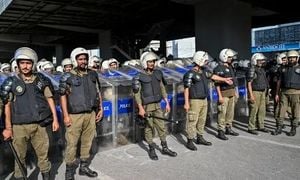Netflix's latest series, La Palma, brings audiences gripping narratives set on the picturesque backdrop of the Canary Islands. Directed by Kasper Barfoed, this drama showcases not only stunning visuals but also raises significant questions about disaster preparedness and human resilience amid natural calamities.
Initially framed within the captivating tropical scenery of La Palma, the story plunges viewers deep within the emotions and struggles of both tourists and locals as they confront threats posed by volcanic eruptions. The plot follows the Ekdal family—including father Fredrik, mother Jennifer, and their children, Sara and Tobias—on what begins as their annual vacation but soon evolves dramatically due to geological unrest.
By intertwining reality with fiction, La Palma capitalizes on the tension surrounding the well-documented Cumbre Vieja volcano, famous for its eruptions, including the significant eruption from September 19 to December 13, 2021. The series cleverly weaves fictional elements around this reality, raising questions about the effectiveness of governmental responses to natural disasters. "The series called the region a ticking time bomb, which, according to a few researchers and geologists, is not true," quipped one article, highlighting debate among scientists about the true dangers of volcanic activity.
While the series focuses on the fictional character Marie Ekdal, portrayed by Thea Sofie Loch Næss, her storyline mirrors the real-life tensions experienced by geological researchers grappling with impending disasters. Prompted by her suspicions about crack expansions on the island, Marie's narrative leads to moments of dramatic flair, juxtaposed with the professional skepticism of her superior, Álvaro, played by Jorge de Juan.
The dramatic premise heightens as the threat of volcanic activity leads to urgent evacuations. Viewers see the chaos and hurried attempts to leave the island as the government struggles to issue timely warnings. Historical insights reveal, "The volcano did go silent... but many individuals are still fighting legal battles to get their fair share of compensation." This underlines the emotional toll faced by victims of natural catastrophes.
Although the majority of residents evacuated successfully during the real eruptions, more than 2,000 homes were destroyed, triggering economic decline and disarray. La Palma’s economy heavily relies on agriculture, especially banana plantations, and the past eruptions left many local farmers struggling to rebuild their livelihoods. The cultural and economic landscapes of the island have drastically changed, dismantling years of stability.
The conflict rises between locals and authorities, with frustrations simmering over the perceived ineffectiveness of disaster management protocols. Amidst this setting, as depicted by the show, Alvaro finds himself torn between alarmist tendencies and the burden of responsibility, following the fallout of his previous exaggerated warnings. He remarks, "Is La Palma based on true events? No, it’s fictional — but the island of La Palma is real," reinforcing the series’ ability to provoke thought whilst crafting its narrative.
Through all the drama, the show doesn’t shy away from showcasing romance blossoming amid chaos, as seen with Sara and Charlie, adding human interest to the intense backdrop of impending doom.
While the series successfully churns tension and keeps audiences on the edge of their seats, it also provides atmospheric insights, prompting viewers to reflect on environmental stewardship and climate change. Many affirm the consequences of overlooking climate challenges can culminate devastatingly, underscoring the necessity of preparedness. "No data suggests the possibility of such an event happening... But then again, nature is unpredictable," speaks to both scientists and creators, reminding viewers of the delicate balance we maintain with nature.
The artistic portrayal of chaos, the urgent fight for survival, and the emotional responses of individuals from all walks of life echo systemic issues relevant to today's environmental challenges. Interestingly, La Palma, as both real and fictional, encapsulates the tension of modern life, exposing vulnerabilities and developing themes around the importance of protecting our environment, presenting a concerning yet poignant look at human existence against the fury of Mother Nature.
Now streaming on Netflix, La Palma not only entertains but educates, sparking discussions around ecological awareness and the unpredictability of natural disasters—all amid thrilling narratives and character development. Themes of resilience, hope, and community support alongside survival permeate every episode.



